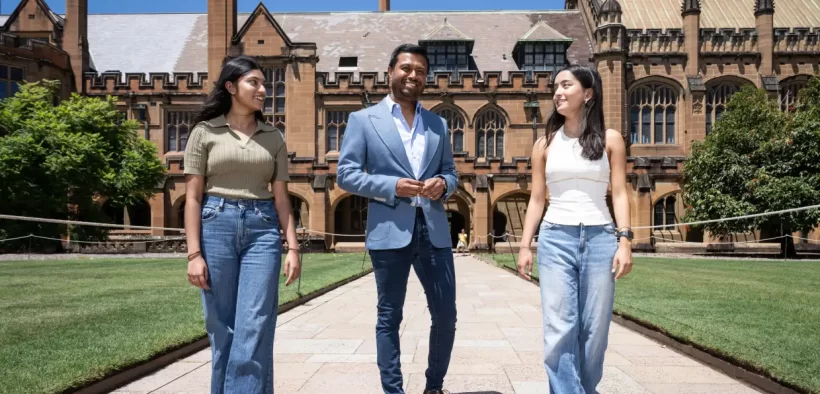Bangladeshi Australian Khuda donates record $100m to boost women in STEM

Bangladeshi born Robin Khuda with Sydney University students Anandikaa Rames (left) and Loretta Payne. Louie Douvis
When Robin Khuda mandated that equal numbers of men and women should be considered for all job openings at his booming data centre company AirTrunk, he did not realise it would lead him to make a record $100 million donation to the University of Sydney.
The gift will develop a pipeline of girls and women from Western Sydney studying science, technology, engineering and maths – the very people he wants to recruit to operate AirTrunk’s giant data centres in Sydney, Melbourne and across Asia.
“To be honest, I wasn’t working towards any specific number,” Mr Khuda said after making the largest philanthropic gift to the university.
Frustrated after years of struggling to find suitably qualified staff to work at AirTrunk’s data centres and noting the industry’s well-documented gender gap, Mr Khuda set out to solve both dilemmas. He worked with the university over 18 months to create a three-tiered, 20-year program.
The Khuda Family Foundation Outreach Program – the first stage – is designed to generate sustained interest in STEM in early high school among both boys and girls.
Stage two is the Khuda Academy for girls in Years 11 and 12 which seeks to reach more than 1200 students once fully implemented and will provide academic and financial support as well as a guaranteed place at Sydney University for those who pass muster.
The third phase is Khuda Scholars, which seeks to build a community of 300 graduates, who will receive scholarship funds, specialised mentoring and academic support during their undergraduate degree. Successful scholars will receive an accommodation stipend of $25,000 to reduce the travel time to and from Western Sydney along with a living expenses payment of $8500 a year.
In technology, roughly one in four workers is female, and they earn 24 per cent less than their male colleagues, according to the Workplace Gender Equality Agency.
Regardless of gender Mr Khuda said it was “very hard to find good candidates with the relevant background”.
But women often chose to work outside the sector, even if they have studied STEM subjects, he said. “It’s a very leaky pipeline. We can do more as a nation, and as a city, to encourage women to take up STEM and prosper in their lives.”
After concerted efforts kicked off four years ago to recruit more women, AirTrunk now has a 38 per cent female workforce.
Anandikaa Ramesh, a third-year software engineering and commerce student at Sydney University who hails from Blacktown in Western Sydney, was acutely aware of the gender divide.
“In my coding classes at university women are still definitely in the minority,” Ms Ramesh said.
“I want to be an advocate for more women to pursue STEM and I think a huge part of women feeling excited and confident about studying STEM subjects and pursuing careers in STEM is the visibility of more women and encouragement from an early age.”
Western Sydney is close to Mr Khuda’s heart. He moved to Westmead as a penniless international student before starting an accounting degree at the University of Technology Sydney. He set up his first two hyperscale data centres in Sydney’s west before expanding into Malaysia, Singapore and Japan.
His parents encouraged him to come to Australia for his university education.
“They wanted me to have a better life. Living in Bangladesh is very different to Australia. They made a big sacrifice to give me that education. But if you invest in education, it bears fruit later on,” Mr Khuda said.
Mark Scott, vice chancellor at the University of Sydney, described the gift as long-sighted.
“It’s a remarkable act of generosity that is highly targeted to the nation’s future,” Mr Scott said.
The previous largest single philanthropic gift to Sydney University was from the Wakil family in 2017 for a health precinct. The largest in Australian history was $250 million in 2022 from philanthropists Geoffrey and Anna Cumming for a global pandemic therapeutics centre at the University of Melbourne.
The Australian Financial Review











